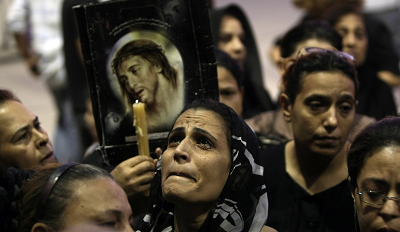
"The report, entitled "Christianophobia," warns that Christians suffer greater hostility around the world than any other religious group, and asserts that politicians have been "blind" to the extent of violence faced by Christians in Africa, Asia and the Middle East."
(From Religion Today)
"The most common threat to Christians abroad is militant Islam, it says, claiming that oppression in Muslim countries is often ignored because of a fear that criticism will be seen as “racism”.
"It warns that converts from Islam face being killed in Saudi Arabia, Mauritania and Iran and risk severe legal penalties in other countries across the Middle East..."
" "A far less widely grasped fact is that Christians are targeted more than any other body of believers.”
"It cites estimates that 200 million Christians, or 10 per cent of Christians worldwide, are “socially disadvantaged, harassed or actively oppressed for their beliefs.” "
"...State hostility towards Christianity is particularly rife in China, where more Christians are imprisoned than in any other country in the world, according to the report."
",,,In Pakistan, the murder last year of Shahbaz Bhatti, the country’s Catholic minister for minorities, “vividly reflected” religious intolerance in Pakistan."
"...The report also warns that Christians in India have faced years of violence from Hindu extremists. In 2010 scores of attacks on Christians and church property were carried out in Karnataka, a state in south west India."
(From The Telegraph)
And an excellent article on The Politics of Persecution:
"American evangelical Christians are afraid: They believe that Christians around the world are persecuted, that Islam is a global threat and that their fundamental values are under assault by a secular culture. American evangelicals are fearless: They are assertive and self-confident, energized and powerful enough to enact legislation that promotes their particular vision of international human rights. These concomitant realities do not form a contradiction so much as a mutually enabling construction. In the last three decades, evangelical fears of persecution have become the impetus for a remarkable surge of activism. The moral geographies of the new evangelical internationalism are in flux. These contain both the seeds of global solidarity and the threat of increasing hostility. Whatever the future holds, however, this history should make one thing clear: We can no longer analyze evangelical politics through the lens of the Moral Majority. Nor does the impending end of the Bush administration herald the end of evangelical influence over US engagement abroad and the cultural imagery that informs it. [33] More than 30 percent of white evangelicals voted for President-elect Barack Obama. A new world has come, and the embodied, border-spanning faith of evangelicals is shaping it for us all."
(From MERIP)


 RSS Feed
RSS Feed